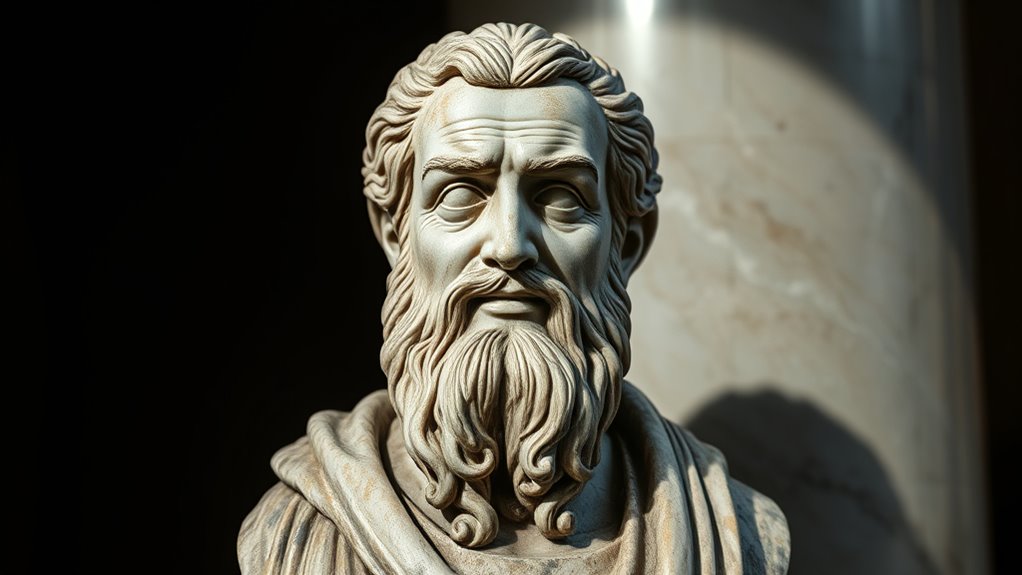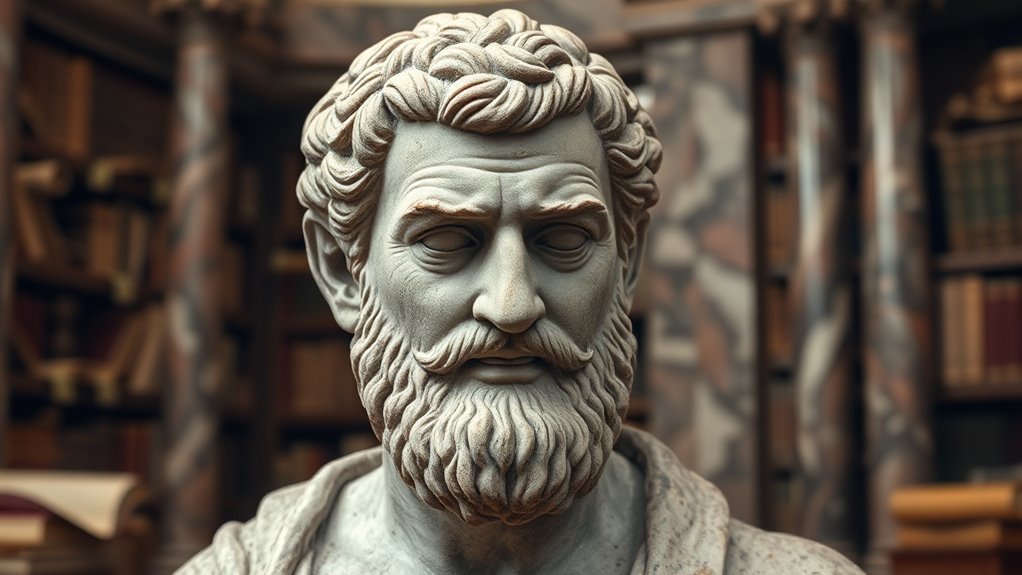Chrysippus was a renowned Stoic philosopher who emphasized internal virtue, resilience, and acceptance of fate. Famous for dying from a laughing fit after watching a donkey eat figs, his story highlights life’s unpredictability and humor’s role in philosophy. His teachings focus on living rationally, cultivating inner strength, and embracing life’s uncertainties. If you want to discover how his ideas on virtue and humor still inspire resilience today, there’s more to uncover.
Key Takeaways
- Chrysippus was a Stoic philosopher known for emphasizing internal virtue and resilience over external success.
- He is famously remembered for dying from a laughing fit after witnessing a donkey eat figs.
- His death symbolizes life’s unpredictability and the role of humor in philosophical reflection.
- Chrysippus developed propositional logic to promote rational responses and emotional resilience.
- His teachings highlight acceptance of fate, internal virtue, and humor as key to living a meaningful life.
Who Was Chrysippus and What Made Him Stand Out

Who was Chrysippus, and what set him apart in the history of philosophy? As a key figure in ancient philosophy, he’s known for emphasizing personal integrity and internal virtue over external success. Chrysippus’s teachings focus on aligning actions with moral standards, promoting resilience and acceptance of fate. His approach to life and ethics highlights that true greatness stems from goodness and strength of character. Unlike many philosophers who focused on abstract ideas, he prioritized practical virtue, making his legacy one of integrity and internal harmony. His influence persists because he championed internal values as the foundation of a meaningful, virtuous life. Additionally, his ideas underscore the importance of internal virtue in cultivating a resilient and harmonious character. Furthermore, Chrysippus believed that cultivating moral resilience was essential for overcoming life’s challenges and maintaining inner peace. Recognizing the significance of personal integrity, he advocated that consistent alignment between one’s beliefs and actions fostered a steadfast moral character. His focus on practical virtue helped bridge philosophical theory with daily life, emphasizing the importance of living ethically in tangible ways.
The Life and Death of a Philosopher Known for Laughter

Chrysippus, the renowned Stoic philosopher, is famously remembered not only for his profound teachings but also for the unusual circumstances surrounding his death—he died from a laughing fit. This event highlights ancient humor’s role in philosophical death, where laughter becomes a symbol of life’s unpredictability. Legend says he laughed so hard over a donkey eating figs that he choked, illustrating how even a wise man could succumb to a moment of joy. His death reflects a philosophical attitude toward life’s uncertainties, reminding us that humor and acceptance are integral parts of understanding existence and embracing our mortality. Recognizing the significance of emotional growth can help us appreciate how even laughter can carry deep philosophical meaning, especially as an expression of our emotional resilience and capacity to find meaning in the unpredictable. It also exemplifies how philosophical attitudes toward life’s surprises can shape our responses to unforeseen events. Additionally, incorporating mindful decluttering practices can serve as a metaphor for clearing mental clutter and embracing life’s surprises with clarity. Moreover, this story underscores how humor in philosophy has historically been a vital element in contemplating life’s absurdities and accepting mortality.
Key Ideas and Teachings of Chrysippus

Understanding the key ideas and teachings of Chrysippus reveals a focus on internal virtue, acceptance of fate, and the importance of living in accordance with reason. In ancient philosophy, he emphasized Stoic ethics, guiding you to prioritize character over external success. Consider these core lessons:
- Cultivate internal virtue—wisdom, courage, justice, temperance—over external wealth.
- Accept fate, recognizing that external circumstances are beyond your control.
- Live rationally, aligning actions with reason and personal standards. Embracing ethical hacking techniques can help you better understand and protect systems from vulnerabilities, reflecting the Stoic principle of prudence.
- Recognize the significance of system vulnerabilities in understanding and safeguarding digital environments. Awareness of how unique and wicked planters can enhance your appreciation of diversity and innovation in design.
- Staying informed about store hours can help consumers plan their shopping efficiently and avoid unnecessary delays. Applying mindful awareness in daily life can further strengthen your resilience and decision-making abilities.
Logic and Reasoning: The Foundations Laid by Chrysippus

Although no original texts by Chrysippus survive, his development of propositional logic transformed philosophical reasoning forever. You now see how he structured arguments with if-then statements, providing clarity in ethical dilemmas. His logic emphasized emotional resilience, helping you navigate life’s uncertainties by focusing on rational responses rather than passions. Chrysippus’s system laid the groundwork for evaluating truth and falsehood, enabling better decision-making. By understanding logical relationships, you strengthen your ability to stay composed and make ethical choices, even under pressure. His reasoning methods continue to influence how you approach complex issues, fostering internal stability amid external chaos. Recognizing the importance of logical reasoning can enhance your critical thinking and decision-making skills in everyday life. Additionally, his methods contributed to the development of formal logic, which remains fundamental in modern philosophical and computational reasoning. Exploring stoic principles can further deepen your capacity for emotional resilience and rational analysis. Furthermore, incorporating mindfulness techniques, such as focused breathing, can help you maintain clarity and composure when applying these logical strategies.
Living According to Stoic Principles

How can you live in harmony with the Stoic principles that Chrysippus championed? Focus on building emotional resilience by controlling your reactions and accepting fate. When faced with ethical dilemmas, remember that external success is irrelevant; integrity and virtue matter most. To embody Stoic living: 1. Practice gratitude for what you have. 2. Prioritize internal virtue over external achievements. 3. View challenges as opportunities to strengthen character. Developing a preppy dog name can also serve as a reminder to maintain dignity and composure in daily life. Emphasizing interior design principles like balance and harmony can help create a peaceful environment conducive to practicing these virtues. Cultivating a positive mindset supports resilience and aligns with the Stoic emphasis on inner strength. Recognizing the importance of dog breeds and their traits can inspire us to cultivate virtues such as loyalty and patience in our own lives. Incorporating power banks for camping into your routine can ensure you stay connected and prepared, fostering a sense of security and calmness amidst uncertainty.
Fate, Virtue, and the Acceptance of Life’s Uncertainties

Fate plays a central role in Stoic philosophy, guiding us to accept life’s uncertainties rather than resist them. You learn to detach from outcomes and focus on internal virtue, which remains within your control. By embracing fate, you recognize that external circumstances are beyond your power, but your response is not. This mindset transforms challenges into opportunities for growth. Consider the table below, illustrating how acceptance and virtue shape your approach:
| External Circumstances | Internal Response |
|---|---|
| Unpredictable events | Acceptance and calm |
| Outcomes beyond control | Detachment from results |
| Challenges for growth | Cultivation of virtue |
The Legacy of Chrysippus in Modern Thought

The ideas of Chrysippus continue to influence modern thought, especially in areas like ethics, logic, and personal resilience. You might face ethical dilemmas where internal virtue guides your choices. His emphasis on emotional resilience helps you stay centered amidst life’s chaos. Consider these lessons:
Chrysippus’s teachings on virtue and resilience guide ethical choices and inner strength today.
- Use logic to navigate complex situations, balancing reason and emotion.
- Prioritize internal virtues over external success for lasting fulfillment.
- Accept fate’s role, understanding that control lies within your attitude and actions.
Lessons From a Philosopher Who Embraced Life’S Absurdities

Chrysippus teaches us that embracing life’s absurdities can lead to inner peace and resilience. By recognizing the humor in mortality and life’s unpredictable twists, you learn to accept what you cannot control. His laughter at life’s paradoxes shows that emotional resilience grows when you don’t take everything seriously. Instead of fighting fate or fearing death, you find strength in humor and detachment. This attitude helps you stay grounded during chaos, knowing that life’s absurdities are part of the human experience. Embracing these truths fosters serenity, allowing you to face mortality with a light heart and unwavering resilience.
Frequently Asked Questions
How Did Chrysippus Influence Modern Stoic Practices?
You see, modern Stoic practices draw heavily on Chrysippus’ ideas of Stoic resilience and rational emotion. He teaches you to accept fate calmly, focus on internal virtues, and respond to challenges with rational control. By practicing internal validation and cultivating resilience, you can handle setbacks without losing your composure. His emphasis on rational emotion helps you distinguish between what you can control and what you must accept, fostering true inner peace.
What Are Some Specific Examples of Chrysippus’ Logical Systems?
You’ll find that Chrysippus developed a sophisticated logical system centered on logical deduction and paradoxical reasoning. He formalized propositional logic with if-then statements, enabling precise argument structures. His approach often involved resolving apparent contradictions using paradoxical reasoning, which helped clarify complex philosophical issues. This system laid the groundwork for later logical theories, emphasizing the importance of rigorous reasoning in understanding truth, fate, and virtue within Stoic philosophy.
How Did Chrysippus’ Death Impact Philosophical Perceptions of Humor?
Have you ever wondered how humor influences our view of life’s unpredictability? Chrysippus’ death, caused by uncontrollable laughter, challenges the idea that humor is trivial. It highlights how humor can reflect acceptance of life’s uncertainties and the importance of internal virtue. His death reminds us that humor has profound philosophical implications, showing that embracing life’s absurdities with serenity can be a form of wisdom, shaping perceptions of humor’s role in human resilience.
Are There Any Surviving Personal Writings or Anecdotes About Chrysippus?
You might wonder if any ancient anecdotes or personal letters about Chrysippus survive. While no personal writings by him are known, ancient sources share stories and anecdotes illustrating his life and character. These tales often highlight his wit, wisdom, and philosophical insights, giving you a glimpse into his personality. Despite the lack of personal letters, these stories help you understand his influence and the enduring legacy of his teachings.
How Does Chrysippus’ Philosophy Compare to Contemporary Ideas on Happiness?
You might find it surprising that Chrysippus’ approach to happiness aligns with modern ideas on emotion regulation and mental resilience. His focus on internal virtue and acceptance of fate helps you stay calm amid life’s chaos, much like today’s stress-management techniques. By cultivating contentment through internal standards and detachment from external success, you build resilience, proving ancient philosophy still offers valuable lessons for emotional stability and lasting happiness.
Conclusion
You might think that greatness comes from fame or wealth, but Chrysippus shows it’s found in virtue and acceptance. His laughter, born from life’s absurdities, reminds you that true strength lies in embracing what you cannot control. In a world obsessed with external success, his story encourages you to find serenity within, where internal resilience and humor become your greatest treasures—proving that sometimes, the most profound wisdom comes from simply laughing at life’s unpredictability.









